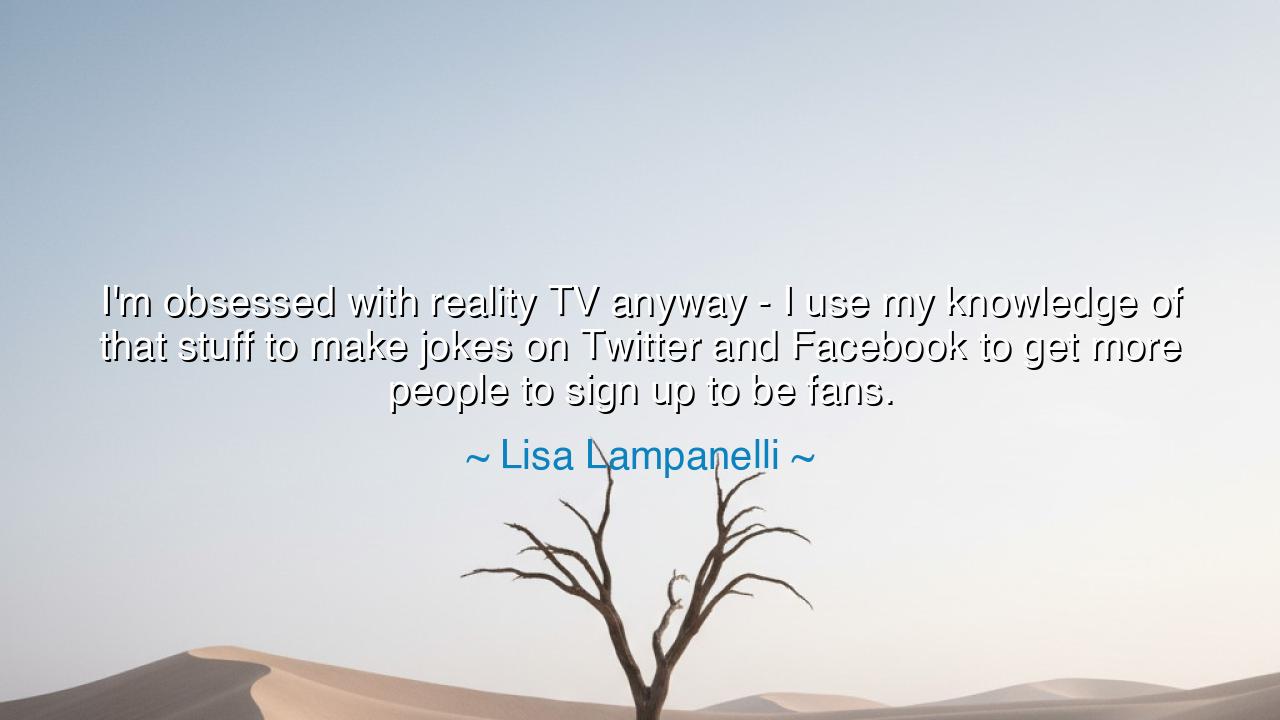
I'm obsessed with reality TV anyway - I use my knowledge of that
I'm obsessed with reality TV anyway - I use my knowledge of that stuff to make jokes on Twitter and Facebook to get more people to sign up to be fans.






In the candid and humorous words of Lisa Lampanelli, the comedian known for her sharp wit and fearless self-awareness, we hear a confession that reveals more than it seems: “I'm obsessed with reality TV anyway — I use my knowledge of that stuff to make jokes on Twitter and Facebook to get more people to sign up to be fans.” Beneath this modern jest lies a reflection on the eternal truth of art and human connection — that even the trivial can become a tool for communication, that even the noisy world of entertainment can be harnessed by the wise to build bridges between souls. It is not the material that makes one great, but the mind that transforms it.
The origin of this thought emerges from the digital age — an era overflowing with distraction, where the line between substance and spectacle grows ever thin. Lampanelli, a craftsman of comedy, understood the new language of her time: a world ruled not by kings or philosophers, but by screens and scrolling thumbs. To reach the hearts of the people, she chose to descend into their world, to speak their tongue. Her obsession with reality TV, far from being a vice, became her instrument — a mirror reflecting both the absurdity and the truth of our shared human condition. For even folly, when examined with wisdom, becomes fertile ground for insight.
To use such knowledge to make jokes is not mere frivolity. The ancients, too, understood that laughter is a sacred fire, burning away pretense and pride. The comedian, like the philosopher, observes life with piercing eyes. Where others see vanity, she sees vulnerability; where others see nonsense, she finds the seeds of meaning. Lampanelli’s wit is a reminder that humor is the language of honesty — and that by turning her fascination with popular culture into art, she transforms distraction into dialogue, amusement into connection. In a world starved for authenticity, even laughter can become a form of wisdom.
Consider the example of Diogenes of Sinope, the ancient philosopher who lived in poverty yet mocked the powerful with truth disguised as jest. When asked why he lived in a barrel, he said, “It is easier to find shelter here than to find honesty among men.” His humor cut through hypocrisy, exposing the shallow pursuits of his age. Like Diogenes, Lampanelli uses laughter to reveal — not the emptiness of power, but the hunger for attention and belonging that defines modern life. Her “reality TV obsession” becomes the barrel in which she sits — her chosen stage from which to mock and enlighten the world.
There is also a profound lesson in her willingness to embrace the culture of her time rather than condemn it. Too many withdraw from the world’s noise, thinking themselves above it. But the true artist, the true communicator, dives into that noise and finds melody. Lampanelli’s use of social media — Twitter and Facebook — becomes symbolic of the modern agora, the public square where ideas, humor, and humanity collide. She understood that to teach or to entertain in this age, one must not speak from the mountain but from within the crowd. To “get more people to sign up to be fans” is, in her own way, to gather a community — to bring strangers into a shared moment of laughter and light.
But behind her humor lies a deeper truth about human nature. We are all, in some way, drawn to reflection through the familiar. The stories we watch, the celebrities we follow, the dramas we consume — all these are mirrors of our longing, our folly, our hope. Lampanelli’s genius was in recognizing that even the most trivial subject can carry truth, if approached with intention. To laugh at others is easy; to laugh with the world while holding up a mirror to it — that is the higher art.
So let this teaching stand as both reflection and challenge: find wisdom even in the ordinary. The material of life — whether sacred or ridiculous — becomes meaningful only in the hands of one who seeks to serve, to connect, to awaken. Like Lampanelli, use what you know — your passions, your curiosities, your “obsessions” — not as chains that bind you, but as tools to reach others. Transform your daily distractions into acts of creation, your small knowledge into shared joy.
For in the end, as Lisa Lampanelli reminds us, even laughter born from the shallow streams of pop culture can become a river of truth, carrying light into the crowded, restless heart of the modern world. The lesson is eternal: it is not the subject that ennobles the speaker, but the purpose that animates the voice. Whether through art, humor, or human connection, let all that you know — even the simplest things — serve the higher calling of love, understanding, and joy.






AAdministratorAdministrator
Welcome, honored guests. Please leave a comment, we will respond soon